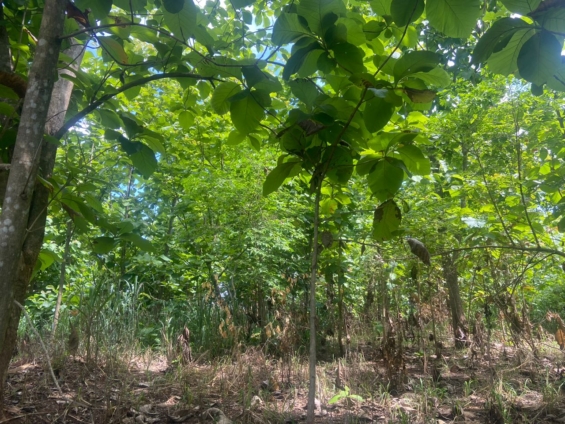New research has said that successfully restoring forests requires a multifaceted approach that addresses climate change, preserves biodiversity, and supports local communities, as prioritising one aspect over others can have unintended negative consequences.
The study by the Universities of Exeter and Oxford reveals that forest restoration plans focused on a single objective often fail to achieve other crucial goals.
However, integrated plans that consider multiple objectives simultaneously can deliver over 80% of the benefits across all three areas, including Climate change mitigation, biodiversity conservation and societal benefits (livelihoods, housing, and energy).
Notably, the study found that socioeconomically disadvantaged groups would benefit disproportionately from this integrated approach, stating the potential for forest restoration to contribute to greater social equity.
“Policymakers need to consider how forest restoration strategies can achieve multiple objectives, accounting for potential tradeoffs and inequity issues,” the study said.
The study published in journal Proceedings of the National Academy of Sciences (PNAS) on August 12, 2024, titled: “Optimizing Restoration: holistic spatial planning to deliver Nature’s Contributions to People with minimal tradeoffs and maximal equity,”states that, the crucial role of forests in mitigating climate change, preserving biodiversity, and supporting local communities. However, the research also reveals that forest restoration efforts inevitably involve trade-offs between environmental and societal outcomes, indicating the need for a balanced and nuanced approach.
The study finds that around 2.5 billion people, or one-third of the global population, reside in areas suitable for forest restoration in the Global South. To achieve successful forest restoration in these regions, prioritizing local community needs is crucial and can be achieved by granting communities’ rights, ensuring their participation in decision-making, and supporting community-led management and governance.
The researchers employed the Nature's Contribution to People (NCP) framework, developed by the Intergovernmental Science-Policy Platform on Biodiversity and Ecosystem Services in 2017. They focused on three key NCPs: Climate change mitigation which assesses forests' role in reducing greenhouse gas emissions; Biodiversity value which examines forests' ability to provide habitats for forest-dependent mammals; and Societal NCP which evaluates the direct benefits of restored forests for human livelihoods, including housing materials and energy. By analyzing these three NCPs, the researchers aimed to understand the complex relationships between forest restoration and its outcomes for both the environment and local communities.
The study applied its findings to a large-scale scenario in India, exploring the benefits of natural regeneration of native forests in suitable areas currently without forest cover.
Restoration projects often have a narrow focus, leading to trade-offs, notes Dr Trisha Gopalakrishna from the University of Exeter. For instance, he says, prioritizing carbon storage might lead to planting specific tree species and restricting access to protect them. Conversely, focusing on biodiversity might also involve managing forests for iconic species like the Bengal tiger or Asiatic elephant. This siloed approach can overlook the interconnected benefits of forest restoration.
“If you focus on human livelihoods, you might plant species that provide housing materials and fuelwood for cooking. The philosophy you choose will dictate your choices. Unsurprisingly, our study shows that plans with one NCP in mind tend not to deliver the others. However, we were surprised and pleased to find that an ‘integrated’ plan can deliver all three remarkably efficiently,” Dr Gopalakrishna.
Latest Stories
-
Semenyo strike gives Bournemouth win over Fulham
21 minutes -
Latif Iddrisu vs IGP: ‘You were not referred for advanced medical attention’ — AG tells journalist
39 minutes -
Modric becomes Swansea ‘investor and co-owner’
53 minutes -
Villa can write themselves into history – Emery
1 hour -
Newcastle boss Howe recovering from pneumonia
1 hour -
Richard Kwabena Asare: Driving Ghana’s economic growth through public sector financing
1 hour -
We don’t want Ahafo North to be like Obuasi, Tarkwa – Parliament Committee to Newmont
2 hours -
Newmont Ghana Gold Limited pays GH₵9.4bn in taxes for 2024
2 hours -
Damanag lease extension: We continue to seek ongoing engagement with government – Gold Fields
2 hours -
Kumasi Metro CEO talks tough in building city on foundation of discipline
2 hours -
3 schools qualify for grand finale of Luv FM Primary Schools Quiz
3 hours -
New gold trading law targets smuggling, formalisation in sector – GoldBod
3 hours -
KMA Mayor to resort to instant corporal punishment to decongest the city
3 hours -
Lands Minister commissions 453 Blue Water Guards, charges them to uphold professionalism
3 hours -
Eunice Amoo-Mensah: Revolutionising pension funds in Ghana through securities lending
3 hours

